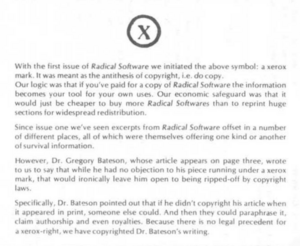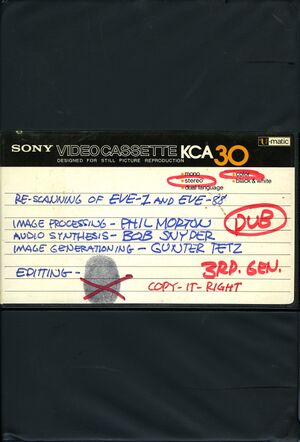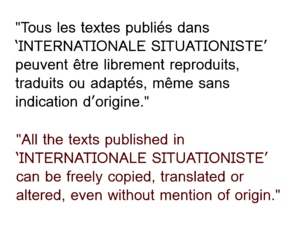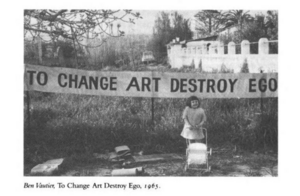Open licenses session: Difference between revisions
No edit summary |
|||
| (46 intermediate revisions by the same user not shown) | |||
| Line 1: | Line 1: | ||
==taking a dive into free, libre and open source licenses== | |||
Pick a license from the list on this page, read/discuss for 30 minutes in groups of 2/3: [[Open licenses]] | |||
==copyright== | ==copyright== | ||
| Line 18: | Line 22: | ||
https://www.gnu.org/philosophy/free-sw.en.html | https://www.gnu.org/philosophy/free-sw.en.html | ||
==free culture== | ==licenses as legal + ideological interfaces== | ||
https://sound.constantvzw.org/Authors-of-the-future/recordings/5_Aymeric_Mansoux_Free_Only_if.wav (27 min) | |||
Aymeric Mansoux, ''Free Only If'' | |||
Presented during [https://constantvzw.org/site/Authors-of-the-future-Re-imagining-Copyleft.html ''Authors of the future: Re-imagining Copyleft''], a study day organised by Constant around open license practices in Brussels, September 2019. | |||
For a deeeep dive, see also: Aymeric's PhD thesis [https://www.bleu255.com/~aymeric/dump/aymeric_mansoux-sandbox_culture_phd_thesis-2017.pdf ''Sandbox Culture: A Study of the Application of Free and Open Source Software Licensing Ideas to Art and Cultural Production'']. | |||
The following things are mentioned in Aymeric's presentation, and we might need to pause when we encounter them for unpacking. | |||
The examples are all coming from his PhD thesis btw, if you want to read more and find others: you can find them in chapter 5. | |||
===notes=== | |||
* practice ↔ society = political | |||
* junction: cybernetic techno-legal view on the world (for example: GPL license) ↔ post-avant-garde art and activist practices in 1900-2000 (for example: sort of underground publishing, ways of challenging intellectual property and copyright) | |||
* pluralism of proto-free licenses (political) ↔ Creative Commons: generalized universal framework (post-political) | |||
* post-political aspect of Creative Commons: one license per economical model + articulation of what is free culture | |||
* from means → to end (and this needs to be reversed) | |||
===xerox mark=== | |||
[[File:A-Xerox-Mark-Radical-Software-1973.png|thumb|left|a "xerox mark" appearing in Radical Software, 1973]] | |||
<br style="clear:both;"> | |||
http://www.radicalsoftware.org/e/volume1nr3.html | |||
===COPY-IT-RIGHT=== | |||
an anti-copyright approach | |||
Morton developed an approach he called COPY-IT-RIGHT, an anti-copyright approach to making and freely sharing Media art. The Distribution Religion and Morton’s individual and collaborative Media art works were released under his COPY-IT-RIGHT license. COPY-IT-RIGHT encouraged people to make faithful copies, caring for and distributing the work as widely as possible. | |||
[[File:COPY-IT-RIGHT-3195163650 73d1e7ed3e o.jpg|thumb|left|"copy it right", Phil Morton 1973]] | |||
[[File:COPY IT RIGHT-morton distributionreligion intro.jpg|thumb|left|snippet from intro Distribution Religion]] | |||
<br style="clear:both;"> | |||
===Situationist International=== | |||
[[File:Situationist-International-publication-statement-1959.png|thumb|left|publication statement of Situationist International (1959]]<br style="clear:both;"> | |||
===Fluxus=== | |||
[[File:FLUXUS-Ben-Vautier.png|thumb|left|Ben Vautier, ''To Change Art Change Ego'' (1965)]]<br style="clear:both;"> | |||
===GPL=== | |||
GNU General Public License | |||
< | https://www.gnu.org/licenses/gpl-3.0.en.html | ||
of | ===copyleft=== | ||
<span style="font-size:150px;font-family:monospace;">🄯</span> | |||
"source of confusion through language" | |||
* used by artists in the 60s already | |||
* the "viral" element used in a subset of open licenses | |||
of | |||
===copyleft sticker story=== | |||
Richard Stallman? | |||
Don Hopkins? | |||
[[File:Copyleft-sticker-Don-Hopkins Sandbox-Culture-Aymeric-Mansoux-page-253.jpg|thumb|left|(…) [O]ne day in 1984 Stallman received by mail a programming manual that had been borrowed by American hacker and computer artist Don Hopkins. On the envelope a stickers reading “Copyleft (L)” was used to seal the small package. Hopkins had bought a pack of stickers at a science fiction convention, where hackers, including Stallman, often gathered and where it was common for them to organise and share rooms, notably for “@” parties in which people with email addresses could meet each other. 14 According to Hopkins, at that time the term copyleft was not part of the hacker culture, and the stickers had been purchased in the dealer’s room of one convention with other comics, political, and satirical stickers and buttons. 15 Knowing Stallman’s appreciation for such things, Hopkins had decorated the letter in a similar spirit. Little did he know that eventually the sticker and the pseudo-copyright statement he had written as a joke (Figure 5.2), would inspire Stallman to use the word copyleft to describe the properties of the GPL. 16 This is how copyleft, the symbol of rebellious cultural practices, ended up being claimed as a term to describe a particular mechanism of free software licensing. Aymeric Mansoux, Sandbox Culture (2017) - p. 211-212]]<br style="clear:both;"> | |||
===Creative Commons=== | |||
https://creativecommons.org/ | |||
"The CC License options": https://creativecommons.org/share-your-work/cclicenses/ | |||
* CC BY | |||
* CC BY-SA | |||
* CC BY-NC | |||
* CC BY-NC-SA | |||
* CC BY-ND | |||
* CC BY-NC-ND | |||
* CC0 | |||
unpacking these acronyms: | |||
* BY = attribution | |||
* SA = share alike | |||
* NC = non-commercial | |||
* ND = no derivatives | |||
==the rising ethical storm== | ==the rising ethical storm== | ||
| Line 49: | Line 120: | ||
{{#Widget:Video|mp4=https://archive.org/download/copyleftconf2020-ehmke/Salle%20des%20Arches%201340%20-%20The%20Rising%20Ethical%20Storm%20In%20Open%20Source.mp4|style=width:700px;}} | {{#Widget:Video|mp4=https://archive.org/download/copyleftconf2020-ehmke/Salle%20des%20Arches%201340%20-%20The%20Rising%20Ethical%20Storm%20In%20Open%20Source.mp4|style=width:700px;}} | ||
Coraline Ada Ehmke on ethical open licenses, presented at CopyleftConf 2020. | Coraline Ada Ehmke on ethical open licenses, presented at CopyleftConf 2020. (27 min) | ||
https://archive.org/details/copyleftconf2020-ehmke | https://archive.org/details/copyleftconf2020-ehmke | ||
The blog post that Ehmke refers to in her presentation by Bruce Perens, in which he critiques the Hippocratic License: https://perens.com/2019/09/23/sorry-ms-ehmke-the-hippocratic-license-cant-work/ | The blog post that Ehmke refers to in her presentation by Bruce Perens, in which he critiques the Hippocratic License: https://perens.com/2019/09/23/sorry-ms-ehmke-the-hippocratic-license-cant-work/ | ||
==See also== | |||
* [[Licenses]] | |||
Latest revision as of 13:38, 27 March 2024
taking a dive into free, libre and open source licenses
Pick a license from the list on this page, read/discuss for 30 minutes in groups of 2/3: Open licenses
copyright
A copyright is a type of intellectual property that gives the creator of an original work, or another right holder, the exclusive and legally secured right to copy, distribute, adapt, display, and perform a creative work, usually for a limited time.
https://en.wikipedia.org/wiki/Copyright
4 free software freedoms
- The freedom to run the program as you wish, for any purpose (freedom 0).
- The freedom to study how the program works, and change it so it does your computing as you wish (freedom 1). Access to the source code is a precondition for this.
- The freedom to redistribute copies so you can help others (freedom 2).
- The freedom to distribute copies of your modified versions to others (freedom 3). By doing this you can give the whole community a chance to benefit from your changes. Access to the source code is a precondition for this.
https://www.gnu.org/philosophy/free-sw.en.html
licenses as legal + ideological interfaces
https://sound.constantvzw.org/Authors-of-the-future/recordings/5_Aymeric_Mansoux_Free_Only_if.wav (27 min)
Aymeric Mansoux, Free Only If
Presented during Authors of the future: Re-imagining Copyleft, a study day organised by Constant around open license practices in Brussels, September 2019.
For a deeeep dive, see also: Aymeric's PhD thesis Sandbox Culture: A Study of the Application of Free and Open Source Software Licensing Ideas to Art and Cultural Production.
The following things are mentioned in Aymeric's presentation, and we might need to pause when we encounter them for unpacking.
The examples are all coming from his PhD thesis btw, if you want to read more and find others: you can find them in chapter 5.
notes
- practice ↔ society = political
- junction: cybernetic techno-legal view on the world (for example: GPL license) ↔ post-avant-garde art and activist practices in 1900-2000 (for example: sort of underground publishing, ways of challenging intellectual property and copyright)
- pluralism of proto-free licenses (political) ↔ Creative Commons: generalized universal framework (post-political)
- post-political aspect of Creative Commons: one license per economical model + articulation of what is free culture
- from means → to end (and this needs to be reversed)
xerox mark
http://www.radicalsoftware.org/e/volume1nr3.html
COPY-IT-RIGHT
an anti-copyright approach
Morton developed an approach he called COPY-IT-RIGHT, an anti-copyright approach to making and freely sharing Media art. The Distribution Religion and Morton’s individual and collaborative Media art works were released under his COPY-IT-RIGHT license. COPY-IT-RIGHT encouraged people to make faithful copies, caring for and distributing the work as widely as possible.
Situationist International
Fluxus
GPL
GNU General Public License
https://www.gnu.org/licenses/gpl-3.0.en.html
copyleft
🄯
"source of confusion through language"
- used by artists in the 60s already
- the "viral" element used in a subset of open licenses
copyleft sticker story
Richard Stallman?
Don Hopkins?
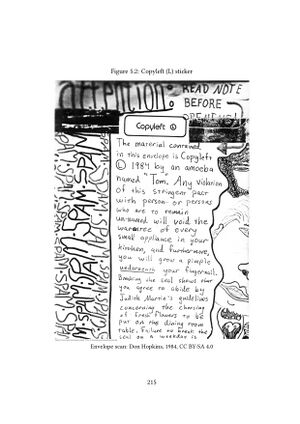
Creative Commons
"The CC License options": https://creativecommons.org/share-your-work/cclicenses/
- CC BY
- CC BY-SA
- CC BY-NC
- CC BY-NC-SA
- CC BY-ND
- CC BY-NC-ND
- CC0
unpacking these acronyms:
- BY = attribution
- SA = share alike
- NC = non-commercial
- ND = no derivatives
the rising ethical storm
Coraline Ada Ehmke on ethical open licenses, presented at CopyleftConf 2020. (27 min)
https://archive.org/details/copyleftconf2020-ehmke
The blog post that Ehmke refers to in her presentation by Bruce Perens, in which he critiques the Hippocratic License: https://perens.com/2019/09/23/sorry-ms-ehmke-the-hippocratic-license-cant-work/

